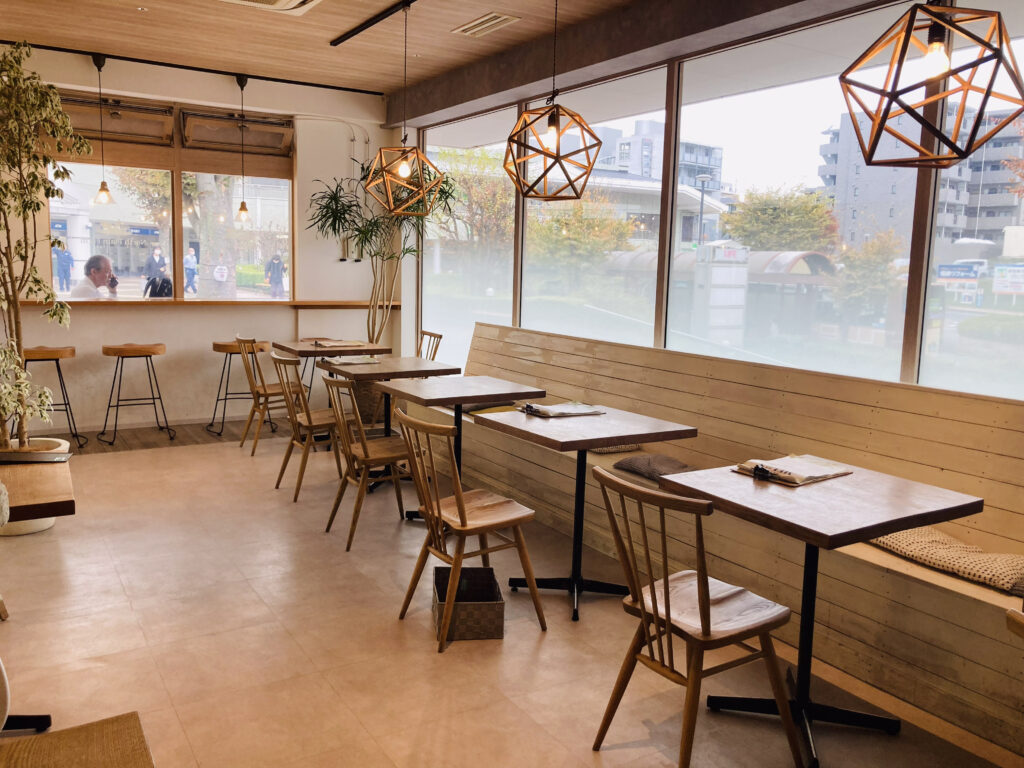In Okoppe, a small community of about 3,500 people facing the Okhotsk Sea in Hokkaido, you’ll find North Plain Farm, Japan’s first organic-certified dairy farm that’s committed to pesticide-free feed, production, and processing. The branch store of the farm, “North Plain Farm Ryokuen” in Yokohama’s Ryokuentoshi, has been a beloved spot for the local community for over 30 years. Its authentic hamburgers and soft-serve ice cream are particularly popular. One of my recommendations is the organic fermented butter, which makes waking up in the morning something to look forward to.
This store’s origin dates back to when the great-grandfather of owner Toshiko Wada raised cattle as a pioneering farmer in Okoppe, Hokkaido. Growing up on a dairy farm, Wada spent her childhood with her older brother helping to carry milk cans while enjoying a carefree life. On rainy days, her mother would bake leaf-shaped waffle cakes on the stove. “It’s better to dream big! It’ll surely come true!” Wada’s bright voice and positive message would instantly captivate those around her. This free-spirited sensibility, nurtured in the vast nature of the Okhotsk region, seems to be the root of her vibrant personality.
Their headquarters in Hokkaido has expanded to nearly 70 employees, and the business is currently managed by Wada’s brother, Hiroshi Daikoku. According to data from the Ministry of Agriculture, Forestry and Fisheries, the number of dairy farms nationwide was about 420,000 in 1963, but by 2024, it fell below 10,000 for the first time. Rises in production costs (including feed expenses), a nationwide decline in milk and dairy product consumption due to changes in dietary habits, and the declining birthrate (meaning a shrinking local population) have all posed challenges. There were times when they had to adjust milk production. Cows can’t reduce their milk output to suit human needs. For dairy farmers, discarding raw milk is a painful task. In addition to selling processed products like organic cheeses, fermented butter, and organic yogurt, Daikoku was searching for ways to create appealing products that go beyond the concept of local production and consumption, and could revitalize not only the local community but the entire dairy industry. At one point, he was asked to guide the chairman of a Yokohama department store on an inspection tour of Hokkaido. During this visit, the guest gave him a great idea by asking, “Can you make a caramel for adults that won’t stick to your teeth?” This simple comment from a consumer’s perspective sparked a new creation. Daikoku decided to use cream sourced from a major local dairy company for the product, thinking that it would spur local milk consumption. After many trials, they developed Japan’s first nama (fresh) caramel. When first released at a small shop in Sapporo Station, it garnered an overwhelming response, with customers amazed by how it “melted in your mouth in ten seconds.” The product went on to be a mega hit, significantly boosting the consumption of local fresh milk.
In Okoppe, the local elementary school still serves Okoppe milk for lunch, just as it did in the past. In a world that continues to change, it is the unchanging things that are truly authentic. “After running this shop for thirty years, we’ve met customers who were still in their mother’s womb when they first visited us, but now they’re mothers themselves. The taste of our soft-serve ice cream and milk hasn’t changed. People who have lived here all their lives grew up eating our soft-serve ice cream, and even those who now live elsewhere sometimes return. That’s something that makes me really happy,” Wada shared.
Since its founding, the farm has consistently practiced sustainable dairy farming by turning cow manure into compost to create rich soil, and growing hay without the use of pesticides or chemical fertilizers. This approach reflects the dairy farmer’s deep commitment to preserving nature. Their desire to connect sustainable dairy farming to the future all stems from one simple principle: “It all starts with dreaming.”
| Address | Izumi-ku, Ryokuentoshi 4-1-2 |
| Hours | Open 10:30-18:00(L.O.17:30) |
| Closed | Tuesdays |
| www.instagram.com/northplainfarmryokuen/ |


